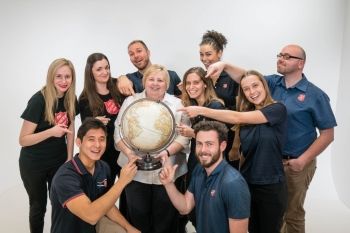Partners in Mission: a powerful force for the Kingdom

Partners in Mission: a powerful force for the Kingdom
4 January 2018
The new Partners in Mission grouping for Australia, effective from 1 January 2018, includes Hong Kong and Macau Command, India Northern Territory, Papua New Guinea Territory, Rwanda and Burundi Command, and Tanzania Territory. Photo:Chuttersnap
As part of the transition to a national territory, The Salvation Army in Australia has been allocated five new Partners in Mission. Throughout 2018, Others will profile each of these “partners”, starting with an overview of what the Partners in Mission global program actually is.
The global community of The Salvation Army is an immense and powerful force for the Kingdom of God,” says Commissioner Floyd Tidd, National Commander of The Salvation Army in Australia.
”In partnership across our global movement we are so much stronger and Partners in Mission demonstrates just how connected in spirit and mission we are. The international Army’s Partners in Mission structure provides a context and face to our movement’s global mission.”
The Partners in Mission program enables Salvation Army territories around the world to engage with each other in mission in a number of different ways. “[This program] ultimately assists us in broadening our horizons and increasing our capacity to make us more aware of the vast and culturally diverse Army in which we serve, as well as opening doors for continual relationship building,” says Commissioner John Wainwright, International Secretary for Business Administration.
“Partners in Mission partnerships are not to be seen solely as fiscal partnerships. The primary funding support for territories is still the International Self Denial Fund and this is not distributed on the basis of the Partners in Mission groupings. The International Self Denial Fund is an internationally pooled fund.
“Neither is the funding for Mission Support dependent on your Partners in Mission grouping, although some territories do give priority to applications from those they have built special relationships with, but International Headquarters seeks to maintain a fair distribution of resources. Partners should strive to be creative in how they envision their partnerships, beyond that which is fiscally driven. Regular communication with partner territories in regard to special events, along with new and innovative initiatives afford great opportunities to inspire and learn from each other. Shared officer or mission team visits are other ways of enhancing the value of the group.”
The new Partners in Mission grouping for Australia, effective from 1 January 2018, includes Hong Kong and Macau Command, India Northern Territory, Papua New Guinea Territory, Rwanda and Burundi Command, and Tanzania Territory. This grouping has been determined based on current international operational boundaries.
“We have also attempted to maintain a high level of zonal and cultural diversity within each grouping, so that our perspectives may each be enhanced and expanded by the influence of our partners,” says Commissioner Wainwright. “We have also kept in mind existing partnerships that are of ongoing mutual benefit.”
international development
In Australia, one of the ways the territory will engage with its partners in mission is through the national Salvation Army International Development (SAID) office. “Partners in Mission territories and commands are important to SAID and we do all
we can to partner with them,” says Lieutenant-Colonel Simone Robertson, SAID Director. “Our relationships with them, though, are just part of
a relationship that starts with the broader Salvation Army.” 
Lieut-Colonel Robertson explains that, although Partners in Mission is often perceived as a program where “supporting” territories give financially to “implementing” territories, the relationships formed are much deeper than that. “At SAID, we, through any projects we have or will have in these territories as part of our strategic framework, are also about building sustainability, capacity, healthy lifestyles and skills through a joint partnership,” she says.
SAID has existing relationships with the India Northern, Papua New Guinea and Tanzania territories. The Rwanda and Burundi Command was a partner in mission with the Australia Southern Territory, and the Hong Kong and Macau Command with the Australia Eastern Territory.
“These relationships are two-way – we don’t just automatically ask to do a project in a partner territory,” explains Lieut-Colonel Robertson. “A project is instigated from an implementing territory and every proposal goes through the same process. As we build relationships with our partners, though, projects can be formulated. And, when a project list comes through from our International Headquarters, we do look at whether the territories involved are our partners in mission.”
Lieut-Colonel Robertson emphasises that the key to any partnership is to come alongside others, as stated in the newly created National Vision Statement, and by doing this see a world restored by the love of Christ, living in dignity and filled with hope. “We want to live this out with our Partners in Mission,” she says.
creative initiatives
Mutual learning between Partners in Mission is vital to the successful development of the program. International Headquarters encourages territories to partner with each other in personal, creative and innovative ways to build each other up and learn from each other.
“The partnership could be a spiritual one – such as doing a soldiers’ Brengle (holiness teaching seminar) with a partner – or learning from the depth of spirituality in our implementing partners,” says Lieut-Colonel Robertson.
“We are not the rescuers, coming in with superior knowledge to save the situation. Such a large, often unseen part of our projects is learning what our implementing partners can teach us – about culture, lifestyle, and incredible survival skills. Our partners are so reliant on God and passionate about soul saving, witnessing and standing up for Jesus – often at great personal risk. We need to be ready to learn and receive from our Partners in Mission as they give to and teach us.”